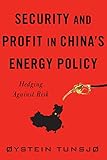Security and Profit in China's Energy Policy : Hedging Against Risk / Øystein Tunsjø.
Material type: TextSeries: Contemporary Asia in the WorldPublisher: New York, NY : Columbia University Press, [2013]Copyright date: ©2013Description: 1 online resource (336 p.) : ‹B›Maps: ‹/B›5Content type:
TextSeries: Contemporary Asia in the WorldPublisher: New York, NY : Columbia University Press, [2013]Copyright date: ©2013Description: 1 online resource (336 p.) : ‹B›Maps: ‹/B›5Content type: - 9780231165082
- 9780231535434
- 333.790951 23
- HD9502.C62 T86 2013
- HD9502.C62 T86 2015
- online - DeGruyter
- Issued also in print.
| Item type | Current library | Call number | URL | Status | Notes | Barcode | |
|---|---|---|---|---|---|---|---|
 eBook
eBook
|
Biblioteca "Angelicum" Pont. Univ. S.Tommaso d'Aquino Nuvola online | online - DeGruyter (Browse shelf(Opens below)) | Online access | Not for loan (Accesso limitato) | Accesso per gli utenti autorizzati / Access for authorized users | (dgr)9780231535434 |
Frontmatter -- Contents -- List of Maps -- Acknowledgments -- List of Abbreviations -- Glossary -- 1. Introduction -- 2. China's Energy Security -- 3. China's Domestic Energy Sector -- 4. The Global Search for Petroleum -- 5. Safeguarding China's Seaborne Petroleum Supplies -- 6. China's Continental Petroleum Strategy -- 7. Global, Maritime, and Continental Implications -- 8. Conclusion -- Notes -- Bibliography -- Index
restricted access online access with authorization star
http://purl.org/coar/access_right/c_16ec
China has developed sophisticated hedging strategies to insure against risks in the international petroleum market. It has managed a growing net oil import gap and supply disruptions by maintaining a favorable energy mix, pursuing overseas equity oil production, building a state-owned tanker fleet and strategic petroleum reserve, establishing cross-border pipelines, and diversifying its energy resources and routes.Though it cannot be "secured," China's energy security can be "insured" by marrying government concern with commercial initiatives. This book comprehensively analyzes China's domestic, global, maritime, and continental petroleum strategies and policies, establishing a new theoretical framework that captures the interrelationship between security and profit. Arguing that hedging is central to China's energy-security policy, this volume links government concerns about security of supply to energy companies' search for profits, and by drawing important distinctions between threats and risks, peacetime and wartime contingencies, and pipeline and seaborne energy-supply routes, the study shifts scholarly focus away from securing and toward insuring an adequate oil supply and from controlling toward managing any disruptions to the sea lines of communication. The book is the most detailed and accurate look to date at how China has hedged its energy bets and how its behavior fits a hedging pattern.
Issued also in print.
Mode of access: Internet via World Wide Web.
In English.
Description based on online resource; title from PDF title page (publisher's Web site, viewed 02. Mrz 2022)


